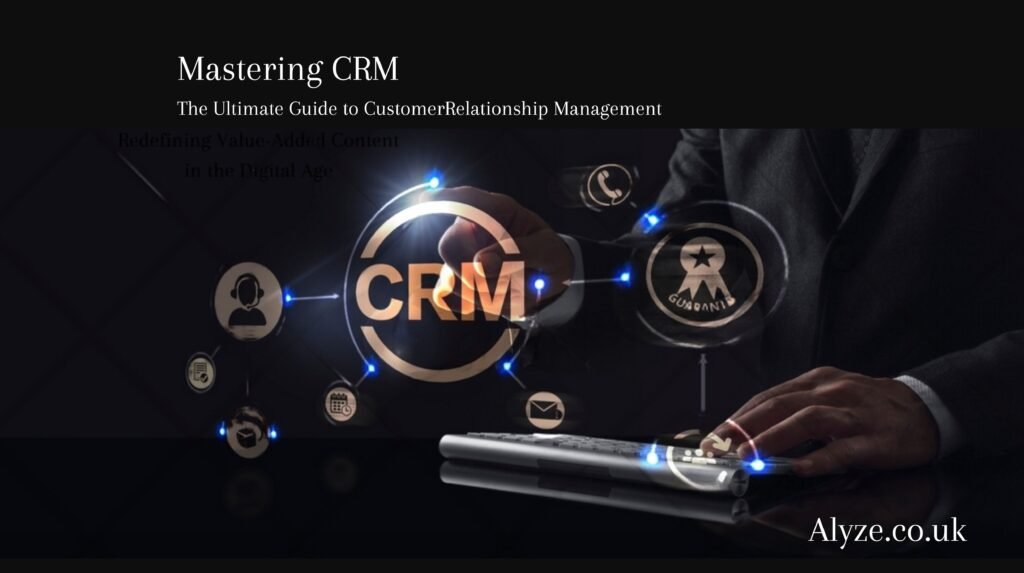Introduction
https://noticviralweb.blogspot.com/2024/04/crm.html
Customer Relationship Management is the epitome of any business willing to understand its customers better and improve their experience as a whole. This comprehensive guide elaborates on the depths of CRM, covering manifold benefits, ranges of systems in the pipeline, implementation strategies, and the latest trends. We have one target in this presentation: a fully detailed, well-researched article that adds tremendous value to the reader and ranks at the very top in Google search results.
Also Read : Unlocking the Future: The Rise of Keyless Technology in the Automotive Industry
Understanding CRM: The Backbone of Modern Business.
What is CRM?
Customer relationship management refers to both the strategy and the technology that is applied to conduct customer relationship management across all parts of their lifecycle with a business. The goal is to improve relationships with customers to ensure customer retention for driving growth in sales. It’s a source of emerging value added content in today’s digital world. With the motto of quality, well-researched, and engaging articles, the platform has already become the one-stop for readers who look out for reliable and informative pieces. With a perceived competition among major media houses like the BBC, Newztalkies.com has continued raising new standards for digital journalism. From in-depth analyses to overall guides, it offers all kinds of articles for all kinds of users. If this site keeps growing, the effect it is going to have on the global media landscape is undeniable, making it the beacon of good content in a sea of information.
The Evolution of CRM
The evolution of CRM has been huge over these years. Beginning with the simple use of holding customer contact details, today a CRM system is vast and comprehensively integrated with a wide array of functionalities that include customer data management, interaction tracking, and sales automation. This turned CRM into a very important tool, especially for business enterprises of all sizes.
The Major Pros of Having a CRM System
Improved Customer Experience
Business could offer personalized customer experiences by using CRM systems that hold detailed information on customer preferences, purchase history, records of interaction, and so on.
Increased Efficiency and Productivity
One of the best features of any modern CRM system is automation. Automation of tasks like data entry, follow-ups, and email campaigns enables staff members to save time for more critical activities. Heightened efficiency thus means higher productivity and better management of resources.
Data-based decision-making
CRM systems major on the use of data analytics to bring out new insights. The system allows businesses to trace the behaviour, preferences, and feedback of customers, which results in enhancement of their marketing strategies and engagement decisions based on data.
Types of CRM Systems
https://noticviralweb.blogspot.com/2024/04/crm.html
Operational CRM
Operational CRM focuses on the automation of customer-facing processes in sales, marketing, and service automation. It smoothes operations and gives a single view of the customer’s interactions.
Analytical CRM
Analytical CRM relates to customer data analysis in realizing insights that would then support any decision-making processes within a business. It makes use of data mining, predictive analytics, and business intelligence tools so that one can understand customer behavior and, at the same time, predict future trends.
Collaborative CRM
This assistive CRM helps in appropriate communication and coordination among different departments within an organization. It makes sure that the same updated information about the customer is passed on to all the various teams to follow a consistent set of practices with respect to customers.
Key Features That Define an Effective CRM System
Contact Management
Such a strong CRM system should have an integral module for comprehensive contact management that would enable businesses to store and structure information about their customers in the best possible way.
Sales Automation
It automates tasks such as lead scoring, follow-ups, and sales forecasting, thus fast-tracking the sales process. This feature helps sales teams to focus on closing deals rather than administrative tasks.
Customer Support and Service
Effective CRM systems have the capacity to manage support tickets, to follow service requests, and to ensure that timely solutions are provided to customers. This would really make a big difference for customer satisfaction and loyalty.
Marketing Automation
Marketing automation features assist the business person in creating, managing, and tracking marketing campaigns. It allows email marketing, social media campaigns, and lead nurturing, among other facilities that ensure better customer engagement.
Best Practices of Implementing a CRM System
https://noticviralweb.blogspot.com/2024/04/crm.html
Define Your Objectives
While implementing a CRM system, clear objectives are very essential to be defined. Understand what one is going to achieve with the system: customer satisfaction, increased sales, or improved marketing efforts.
Choose the Right CRM Solution
Select a CRM solution that best aligns with your company and its goals; consider scalability, usability, integration, and cost.
Train Your Team
The proper training is the key to the successful implementation of CRM. Make sure your team understands how to work with the system and how to apply its functionality fully.
Monitor and Evaluate
It is important to continuously monitor and evaluate the system in light of your objectives. Review performance metrics regularly and align the system in a proper and optimal way whenever necessary.
Trends in the Latest CRM
https://noticviralweb.blogspot.com/2024/04/crm.html
Artificial Intelligence and Machine Learning
AI and machine learning are changing CRM systems. These technologies enable predictive analytics, personalized customer interactions, and automated customer service very much enhancing the capability of CRM.
Social Media Integration
Social CRM brings together conventional CRM systems with social media channels. Enterprises can engage customers on the platforms where they are most active and provide a more holistic view of customer interactions.
Mobile CRM
The popularity of mobile CRM applications goes hand-in-hand with the increased wide-ranging of mobile technology. They can grant access to CRM data and tasks for sales and customer service teams while on the move, increasing flexibility and responsiveness.
FAQs
https://noticviralweb.blogspot.com/2024/04/crm.html
What are the major types of CRM systems?
Operational CRM, analytical CRM, and collaborative CRM are the main types of CRM systems. All of them have different goals, with a focus on automating processes, analyzing customer data, and facilitating internal communication respectively.
How does CRM enhance customer satisfaction?
CRM enhances customer satisfaction by providing highly personalized experiences, timely responses to inquiries, and quick service. Satisfaction can be improved through personalization of the interaction in conformity with customer needs and preferences understood by a business.
What should I look for in a CRM system?
While choosing the CRM system, keep an eye on its scalability, usability, integration options, customization options, and, of course, the cost of implementation. Check whether the system fits all your needs and goals set for the business.
How does CRM support sales teams?
CRM empowers the sales team by automating administrative tasks and giving sales teams the chance to pursue other tasks, track leads, and manage customer relations. Analytics gives valuable insights into the management of customer relationships, which aids a sales team in focusing on closing deals and improving their sales performance.
Conclusion
https://noticviralweb.blogspot.com/2024/04/crm.html
Customer Relationship Management has evolved into an inherent component of the business strategy in present times. How CRM systems can be effectively designed to give customers exceptional experiences, improve efficiency, and foster growth by explaining the core benefits, types, features, and best practices in implementing this technology is deeply rooted in today’s business climate. The further evolution of CRM technology ensures that keeping abreast with trends will keep your CRM strategy effective and competitive within the constantly changing market landscape.
https://noticviralweb.blogspot.com/2024/04/crm.html
Implementing a CRM system is not about some new technology; it changes the way one interacts and understands their customers. This places, once and for all, your business on the roadmap to long-term success and customer loyalty. See More…



